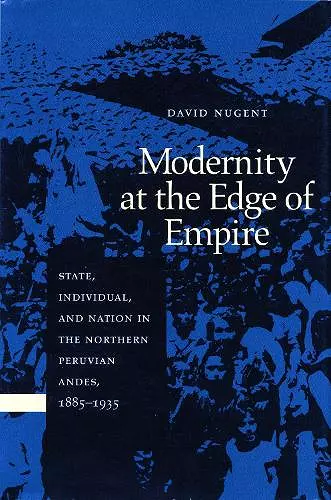Modernity at the Edge of Empire
State, Individual, and Nation in the Northern Peruvian Andes, 1885-1935
Format:Hardback
Publisher:Stanford University Press
Published:1st Sep '97
Currently unavailable, and unfortunately no date known when it will be back
This hardback is available in another edition too:
- Paperback£29.99(9780804729581)

Challenging much received wisdom about nation-states—how they form, what sustains them, why they fail—this study of subaltern social groups in the Chachapoyas region of Peru analyzes the emergence of the modern nation-state "from below." By approaching nation-state formation from the perspective of the subaltern, the book offers a critique of scholarship that sees coercion and the imposition of social and cultural forms as the core of nation-state expansion. This “coercive” view bears virtually no relation to the complex transformations in power, culture, and economy that resulted in the consolidation of national control in the Chachapoyas region.
In Chachapoyas, subaltern social groups had long been subject to the abuses of a social order based on principles of aristocratic sovereignty. In the 1920's, these popular forces mobilized around an alternative vision of community that promised to deliver them from their aristocratic overlords—a national community, based on modernity and popular sovereignty. In 1930, the subaltern challenged the elite in an armed uprising, seized control of regional affairs, and established a new form of public culture. Because these newly ascendant popular groups regarded the nation-state as a powerful force for emancipation, they made national values and state institutions an integral part of public culture. In the process, they brought the nation-state into being in Chachapoyas.
"This book, with its fine integration of theoretical argument and historical and ethnographic detail, makes the author a major figure in political anthropology and Latin American studies. Throughout the book, he shows a deep and practical understanding of the mechanisms, instrumentalities, and relations of power, which makes him a worthy successor to such figures as Eric Wolf and Joan Vincent." -William Roseberry,New School for Social Research "This superb book presents a radically new perspective on the emergence of the modern state in Latin America. The author has done an amazing job of pulling together obscure historical sources and oral history material in order to tell this story. There has not previously been such a vivid and detailed picture of how patronage relations worked in Latin American economies at the turn of the century, and of the forces that led to their decline in the 1930's." -Jane L. Collins,University of Wisconsin-Madison
ISBN: 9780804727822
Dimensions: unknown
Weight: unknown
420 pages